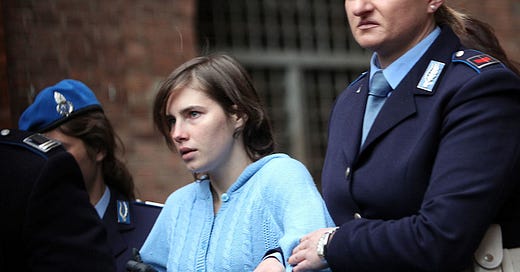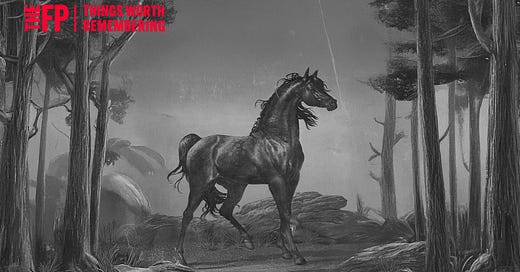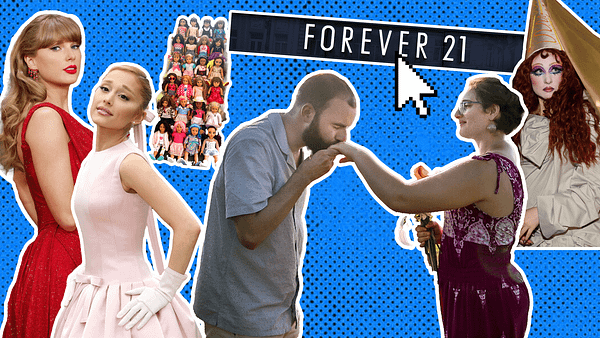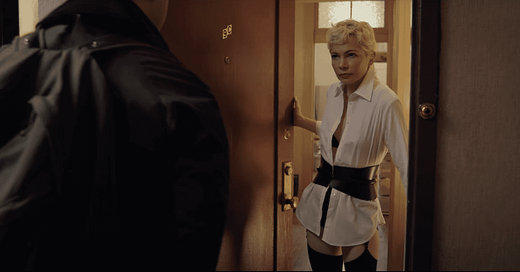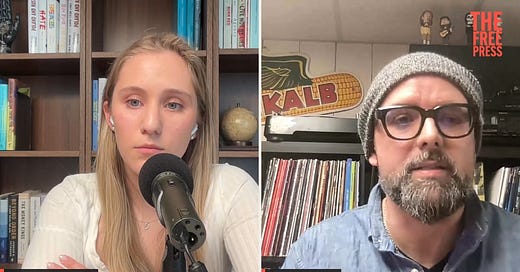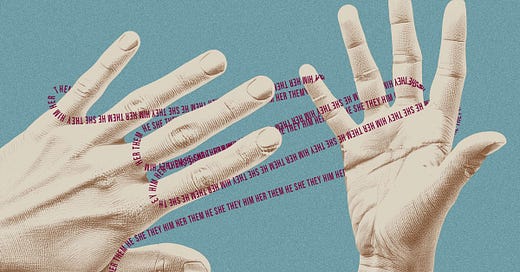
In November 2007, in Perugia, Italy, an American exchange student named Amanda Knox was accused of having taken part in the murder of her British roommate, Meredith Kercher. Knox was accused even though there was zero evidence tying her to the murder, and a great deal of DNA evidence implicating a local burglar for raping and stabbing Kercher to death.
After spending two years in prison, Knox was found guilty in December 2009. She was 22 at the time, and she was sentenced to 26 years behind bars. In 2010, Knox’s lawyers appealed her verdict, and on October 3, 2011, the conviction was overturned. She flew home the next day.
Knox subsequently completed her college degree at the University of Washington and wrote a best-selling book, Waiting to Be Heard: A Memoir. She now lives in Seattle with her husband and daughter, and cohosts the podcast “Labyrinths.”
The essay below is based on a recent Twitter thread that moved us deeply. When we asked Amanda what inspired her to write it now, she said this: “The instability of our present moment is real. And we are right to stare that uncertainty in the face. But that doesn’t mean we have to be fatalist. When I hear the doomsaying about our democracy, about civilization, about the planet something feels off to me: a sense of responsibility.”
After I was convicted of murder and sentenced to 26 years in prison, when the earth dropped out from beneath me and global shame rained down on top of me, I had my first ever epiphany.
I didn’t know what an epiphany should feel like, but it was. . . cold. Like a clear breeze blowing in and brushing the back of your neck, making your hair stand up. I knew something deep down that I hadn’t known before, and I spent the next several months peering into that epiphany, trying to consider all of its implications, like watching the ripples spreading out from a drop in a pool of water.
My life had derailed the moment my roommate, Meredith Kercher, was brutally raped and murdered. Five days later, my boyfriend, Raffaele, and I were arrested and charged with her murder. This was based on a police hunch, and on a coerced confession that the police gaslit me into signing—after 53 hours of interrogation over five days, in a foreign language and without a lawyer, after being sleep-deprived and hit and told I had amnesia, they broke me and I signed what they told me to sign.
But just over a week later the forensic evidence came back, and it implicated a single perpetrator. A local burglar named Rudy Guede had left his DNA all over the crime scene and on Meredith’s body; he left his fingerprints and footprints in her blood. There was not a single trace of me found in that room, and it would not have been possible for me to participate in that violent and bloody struggle without leaving any DNA. So despite all the lies being told about me in the press, despite the prosecution’s insane theory woven out of whole cloth—a sex game gone awry—I believed, as did my lawyers, as did my family, that the adults in the room would eventually clear this whole mess up.
It took two years for this absurd trial to reach verdict day. I truly believed on December 4, 2009, as the judge and jury filed in, that I was just a lost tourist waiting to go home, that my life, which had been derailed, was finally about to get back on track.
And then they convicted me.
The next day, back in the prison—the word colpevole, guilty, echoing in my head—I silently swept a corridor during my work shift. I overheard one guard say to another: Poor thing. She doesn’t understand what just happened. They thought, since I wasn’t hysterically sobbing, that I hadn’t absorbed the fact that I was going to spend the next 26 years trapped in this place.
I was quiet precisely because I was sitting with my epiphany. And it was this: I was not, as I had assumed for the past two years, waiting to get my life back. I was not a lost tourist waiting to go home. I was a prisoner, and prison was my home.
I’d thought I was in limbo, awkwardly positioned between my life (the life that I should have been living), and someone else’s life (the life of a murderer); I wasn’t. I never had been. The conviction, the sentence, the prison—this was my life. There was no other life I should have been living. There was only my life, this life, unfolding before me.


